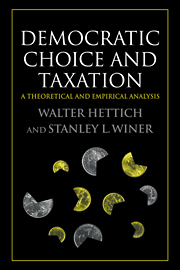Book contents
- Frontmatter
- Contents
- Preface
- 1 Introduction
- PART ONE THEORETICAL FRAMEWORK
- PART TWO COLLECTIVE CHOICE AND THE NORMATIVE ANALYSIS OF TAXATION
- PART THREE APPLIED GENERAL EQUILIBRIUM ANALYSIS
- PART FOUR STATISTICAL ANALYSIS OF TAX STRUCTURE
- 8 Introduction to Statistical Research
- 9 Income Taxation and Special Provisions: Evidence from U.S. States
- 10 Debt and Tariffs: The Evolution of the Canadian Revenue System
- PART FIVE POLITICAL INSTITUTIONS AND TAXATION
- Bibliography
- Name Index
- Subject Index
10 - Debt and Tariffs: The Evolution of the Canadian Revenue System
Published online by Cambridge University Press: 08 October 2009
- Frontmatter
- Contents
- Preface
- 1 Introduction
- PART ONE THEORETICAL FRAMEWORK
- PART TWO COLLECTIVE CHOICE AND THE NORMATIVE ANALYSIS OF TAXATION
- PART THREE APPLIED GENERAL EQUILIBRIUM ANALYSIS
- PART FOUR STATISTICAL ANALYSIS OF TAX STRUCTURE
- 8 Introduction to Statistical Research
- 9 Income Taxation and Special Provisions: Evidence from U.S. States
- 10 Debt and Tariffs: The Evolution of the Canadian Revenue System
- PART FIVE POLITICAL INSTITUTIONS AND TAXATION
- Bibliography
- Name Index
- Subject Index
Summary
The spirit of a people, its cultural level, its social structure, the deeds its policy may prepare – all this and more is written in its fiscal history, stripped of all phrases.
Joseph Schumpeter (1918, p. 101)Writing history is constructing a coherent story of some facet of the human condition through time. Such a construction exists only in the human mind. We do not recreate the past; we construct stories about the past. But to be good history, the story must give a consistent, logical account and be constrained by the available evidence and the available theory.
Douglass North (1990, p. 131)More than eight decades ago, Joseph Schumpeter (1918) published an outstanding essay on the fiscal state. He argued that the ability to tax lies at the very heart of political power and that the rise of the modern political state was shaped by fiscal evolution in medieval and postmedieval times. Although he was primarily interested in the influence of fiscal power on political power, he also raised a related set of questions about what forces shape fiscal structure itself. He clearly recognized that revenue systems consist of a number of related components chosen in the light of three types of influences: economic, political, and administrative. But he did not provide a framework of how these factors interact to shape evolving revenue systems, perhaps because he had not yet formed an economic theory of political action.
- Type
- Chapter
- Information
- Democratic Choice and TaxationA Theoretical and Empirical Analysis, pp. 237 - 262Publisher: Cambridge University PressPrint publication year: 1999



